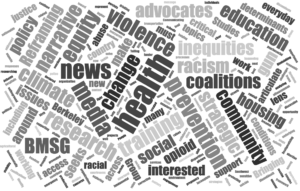BMSG is interested in many public health issues.
But we can only research the areas we have funding for. Below are the topics our research and training teams want to tackle in greater depth.
If you’re a funder interested in helping us to jump start one of these projects or an organization who would like to collaborate, please contact us and let us know!
Telling a more complete story about police and community violence
We can’t solve a problem we don’t know is happening — and when it comes to gun violence, the news paints an incomplete or inaccurate picture of the very real problem of everyday, all-too-common gun violence. With support from The Hope and Heal Fund, we are working to broaden the narrative about gun violence to help advocates and journalists communicate about everyday gun violence, why it matters, and how it can be prevented — in hospitals and homes, in communities and courtrooms, in schools and on streets around the country. We are eager to find ways that our research and training efforts can support advocacy and narrative change efforts within communities (like LGBTQ, Black, and Latinx communities) that are impacted by violence, but whose perspectives and lived experiences are often ignored or marginalized.
Bringing a health equity lens to the opioid epidemic
In 2017, the Department of Health and Human Services declared a public health emergency related to opioids, but the problem persists. Berkeley Media Studies Group seeks to continue exploring how the media can shed light on solutions to opioid abuse and overdose, as well as the underlying social, political, and economic conditions that must be addressed to end the opioid epidemic.
Social determinants of health: Reframing racism, health inequities, and government
People, coalitions, and organizations across the country are working to make racial and health equity a reality, and BMSG is supporting these efforts through research, training, and strategic consultation. BMSG seeks to articulate new avenues for making clear not only the disparities that exist now but also the unnatural and unjust processes and conditions that have created them, and what the role of government is in correcting them. Often this work raises new research questions and ideas for advancing on-the-ground work through training and support. Our interests in the social determinants of health — and their connection to structural racism — include housing, immigration policy, transportation, the built environment and land use, civic engagement, taxes, education, criminal justice, and more.
Destigmatizing reproductive freedom
Some of our country’s most divisive debates are around birth control access, teen pregnancy prevention, and abortion rights, among other critical reproductive health concerns. We know that access to critical information and services are fundamentally rooted in protecting health and can have life-and-death ramifications for women and men nationwide. BMSG seeks to identify strategies to shift the discussion around these sensitive topics from a question of morality to a complex framework seen through the lens of reproductive justice.
Communicating about climate change from a public health perspective
The effects of climate change represent some of the most fundamental challenges to our society. Diminishing rainfall across the Southwest due to droughts, for example, threatens the security of our drinking water supply and our agricultural production. The public health community has an opportunity to lead policy responses to this crisis yet, until recently, has been largely silent on the issue. BMSG is interested in researching how best to frame climate change from a public health and equity perspective (including its psychosocial aspects) and in training advocates to disseminate this message to communities so they can articulate its importance to policymakers.
Raising visibility of LGBTQ health issues in the news
LGBTQ individuals face higher risks and rates of many health issues including depression, substance abuse, and suicide. Yet these issues, and the social stigma that drives them, receive relatively little news coverage. To move toward solutions, we first must make the problem more visible. BMSG can contribute to that process by analyzing news coverage to uncover a baseline for the conversation, determine gaps in reporting, and make recommendations for next steps.




